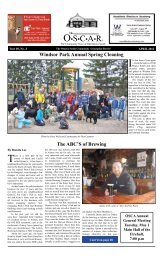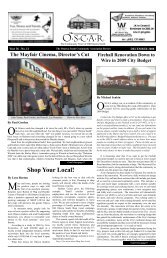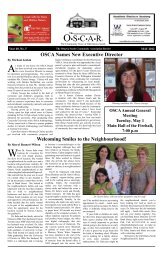Firehall Fest a Smashing Sunfilled Success - Old Ottawa South
Firehall Fest a Smashing Sunfilled Success - Old Ottawa South
Firehall Fest a Smashing Sunfilled Success - Old Ottawa South
Create successful ePaper yourself
Turn your PDF publications into a flip-book with our unique Google optimized e-Paper software.
Page 14<br />
Book review<br />
by stephen a. haines<br />
BOOK REVIEW<br />
Captivity<br />
by Debbie Lee Wesselmann<br />
John F. Blair Publishing,<br />
2008<br />
ISBN-10: 0895873532<br />
Born to a middle-class academic<br />
family, Dana Armstrong might<br />
have expected to lead a sedate<br />
life. She had loving parents, a younger<br />
brother, Zack, and a “sister” - Annie.<br />
Interacting with loving care toward<br />
each other, they seemed the ideal<br />
The OSCAR - OUR 36 th YEAR<br />
Family Problems<br />
family. But there was a discontinuity<br />
- Annie was a chimpanzee. The trio<br />
was part of an experiment by Dana’s<br />
father Reginald. Primate researchers<br />
in the 1970s were eager to learn if<br />
human-chimp communications could<br />
be achieved. Living with a human<br />
family continuously instead of in a<br />
labatory facility seemed the best<br />
opportunity. Wesselmann, in a finely<br />
wrought tale of the experiment and its<br />
consequences has provided us with a<br />
stirring, yet sensitive tale.<br />
She opens with Dana well along<br />
in her life. She’s gained a PhD in<br />
Primatology, following her father’s<br />
path, and operates a sanctuary for<br />
chimps that have been subjected<br />
to a range of medical experiments,<br />
including being given AIDS. Her<br />
<strong>South</strong> Carolina site seems ideal,<br />
isolated, well protected to reduce<br />
outsider concerns, and funded by<br />
caring donors. She’s on the local<br />
university staff, keeping her academic<br />
foundation firm. Yet, somebody has<br />
gained access to the site, releasing the<br />
chimps. In the course of recovering<br />
them, one of the chimps is struck by<br />
Debbie Lee Wesselmann<br />
author of Captivity<br />
a car and killed. The facility is hardly<br />
a secret, but the community rises in<br />
protest. It also garners the attention<br />
of somebody Dana had been trying<br />
to forget - Prof. Richard Lamier.<br />
Complicating her circumstances yet<br />
further, a new element enters her life<br />
in the person of Sam Wendt. Just<br />
what she doesn’t need now is a critical<br />
journalist writing to an already hostile<br />
community. But Sam says magic<br />
words about her childhood with Annie.<br />
He’s not to be summarily dismissed.<br />
Wesselmann builds her story<br />
and her characters with seemingly<br />
effortless grace. It is only as event<br />
progress and interaction builds that the<br />
power of her prose emerges. The pace<br />
is swift and furious - this is not a book<br />
easily set aside - but nothing is forced<br />
or contrived. Dana is beset by many<br />
foils - Lamier emerges with increasing<br />
presence from the background, but it’s<br />
her own brother Zack on whom much<br />
of this story hinges. He’s a wastrel,<br />
an emotional nomad, and a constant<br />
pressure on her goodwill and energy.<br />
There’s a hint that he may have had<br />
something to do with releasing the<br />
astonished at the “humanness” of chimpanzees.<br />
Others have written to thank me for bringing the<br />
issues to public awareness. Still others are fascinated<br />
with the background I provided for Dana, her family,<br />
and the chimp-sister she grew up with. Most want to<br />
know where the line lies between fact and fiction.<br />
O: How does a human learn to interact with<br />
these powerful animals?<br />
DLW: Ideally, humans shouldn’t interact<br />
with them at all, but, of course, that’s not possible<br />
with captive animals. Some people believe that<br />
chimpanzees only understand power and dominance,<br />
which equates to cattle prods and punishment, but<br />
fortunately most people now believe that the best<br />
way is on the chimpanzees’ own terms. A person<br />
must gain a chimpanzee’s trust through kind<br />
interaction and by learning the use of chimpanzee<br />
communication grunts, hoots, gestures, and facial<br />
JUL/AUG 2008<br />
chimps, although motivation seems<br />
lacking. The chimp release leads to<br />
widespread implications with the<br />
future of the sanctuary and Dana’s<br />
own career hanging over an abyss.<br />
She has little but her own resources of<br />
strength and cunning to draw on. Can<br />
that possibly be enough with all that’s<br />
arrayed against her?<br />
The author’s account goes beyond<br />
just prose skills. Clearly this work<br />
rests on a solid research base. It’s easy<br />
to believe Wesselmann was at the side<br />
of more than one primatologist, likely<br />
in a refuge such as the one depicted<br />
here. Chimp behaviours - including<br />
one young one obviously brought up<br />
among humans, who insists on clothes<br />
and a potty, are too vividly depicted<br />
and explained to be fabricated. Her<br />
research points up the underlying<br />
importance of the subjects in this<br />
tale - can we justify what we do in<br />
experimenting on animals. Especially<br />
our closest living cousins<br />
[stephen a. haines - <strong>Ottawa</strong>,<br />
Canada]<br />
Interview ... Cont’d from next page<br />
expressions. Social bonds are cemented through<br />
mutual grooming. Someone who is intimately<br />
familiar with chimpanzee behavior stands a better<br />
chance at peaceful interaction than someone whose<br />
knowledge is only superficial; however, anyone who<br />
works with chimpanzees, particularly male ones,<br />
risks serious injury on a daily basis.<br />
O: What’s the value of teaching chimpanzees<br />
ASL?<br />
DLW: Right now? None. Washoe, Nim, Lucy,<br />
Ally, and the other chimps who learned American<br />
Sign Language during the linguistic studies of the<br />
1970s disproved the previously held notion that<br />
language separated humans from all other species.<br />
We could have learned this same truth through<br />
close observation since naturalists and biologists<br />
have observed communication in several species<br />
-- and ASL had nothing to do with it. I will say<br />
that the chimpanzees’ acquisition of ASL sped up<br />
our understanding of their emotional lives and<br />
intelligence because it was the first time that we<br />
communicated back and forth with another species,<br />
albeit in a very limited way.<br />
O: Is it a good thing to train chimpanzees to live<br />
with humans in a household?<br />
DLW: It cannot be done. Chimpanzees can be<br />
successfully integrated in a human household until the<br />
age of five or so when their chimpanzee nature begins<br />
asserting itself in earnest. Until then, they seem like<br />
cute, furry humans. However, as adolescents, they<br />
become extremely destructive and dangerous. They<br />
assert themselves by hurling objects, screaming,<br />
and biting. And they are fantastic escape artists --<br />
much more adept than the humans who try to contain<br />
them. I don’t know of a single adult chimp able to<br />
live peacefully in a human household. Even animal<br />
trainers don’t use their chimpanzee actors past the<br />
age of six. Don’t get me started about what happens<br />
to chimpanzees once they outlive their usefulness as<br />
entertainment animals.










